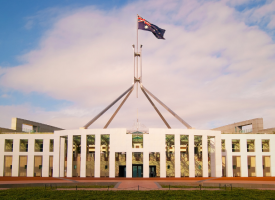Dr Bartone - RN Breakfast - Federal Election Outcome
Transcript: AMA President, Dr Tony Bartone, ABC Radio National, RN Breakfast with Fran Kelly, Wednesday, 22 May 2019
Subject: Federal Election result, health policy
FRAN KELLY: While Adani and tax emerged as two pivotal issues for voters last Saturday, health featured high in Labor's campaign. There were big spending announcements around cancer treatment, you’ll remember, also public hospitals and dental care- free dental care for seniors. By contrast, the Coalition's health spending promises were more modest; the biggest a plan to slash patients' out of pocket cost by reducing the Pharmaceutical Benefits Scheme's thresholds from January next year. Ahead of the Federal Election, the AMA was expressing disappointment that no party had an overarching vision for the long-term future of our health system.
Tony Bartone is the AMA President. Tony Bartone, welcome back to Breakfast.
TONY BARTONE: Good morning, Fran.
FRAN KELLY: We have a new Government, as I just said earlier. I'm sure they're all ears right now at this point in the cycle. What are the priority health issues that the AMA wants the Government to address?
TONY BARTONE: Well as you've already said, Fran, we did put out a little memo in the lead-up to the election that really said that there'd been a lack of an appropriate overarching vision. We put out a statement of 21 key health issues and the funding and the resources required to implement that at the beginning of the election campaign. They haven't changed. They still remain active areas of discussion and to negotiate with the - presumably - Minister Hunt, who would seem to be remaining in that portfolio. We await the advice of the Prime Minister once he announces his Cabinet ministry. But clearly, there is work to do.
General practice, we did see reforms in primary care, they were announced as part of the Budget, but there's still more work to be done there. Public hospitals do need a significant investment. We're hearing time and time again - we released our Report Card in the election lead-up that showed that our public hospitals are under significant stress, and things are just looking incessantly more troublesome there.
But the other part of the equation is to ensure that we have discussion about increasing the investment into health, especially as we approach the increasing burden of chronic disease of an ageing population, and of a population that's growing very rapidly at the moment, and ensuring that we meet the demands and the needs required by Australians.
FRAN KELLY: Let's break those down a bit. For starters, you mentioned Greg Hunt as the Health Minister, is the AMA backing him to be the Health Minister in the new Morrison Ministry? Are you happy with Minister Hunt?
TONY BARTONE: It'd makes sense to keep Minister Hunt there because basically he's already across his portfolio. He's been there for a significant amount of time. The next three years is a really critical time as we lead into, as I mentioned, those burgeoning challenges. He's across his brief, he understands the portfolio, it makes sense to keep him there.
FRAN KELLY: Let's go to hospitals, because that was a major part of Labor's pitch, that they were going to put record funding into hospitals, and to our schools, and the Coalition's response to that was funding is already at record levels. They weren't promising to increase that. Are you saying that the Morrison Government needs to actually work out a way to grow that pie, whether it's getting more out of the States, or committing more from the Federal Government itself?
TONY BARTONE: We need to be very clear about this, Fran. Yes, we are funding at record levels, but that's because the population is growing, the demand is growing, the population is ageing, and the burden of chronic disease is growing. We need to get smarter and cleverer. We need to make sure that the funding is appropriate to match the demand. We need both sides - State and Federal - to come together to ensure that funding is appropriate. But we need to make sure that we're doing things better. Rather than just funding volume, we need to fund efficiency and growth, and better ways of doing things to ensure that we're getting the most out of those scarce health resources.
FRAN KELLY: Yeah, but how many times have governments tried to rework the formula for funding, and work with the States to change, you know, the case management system, for instance, and all of that? You're saying we still don't have it right?
TONY BARTONE: Absolutely. So the activity-based funding, which underpins a model of funding to hospitals, has been there for a while. That has had its day, because you can only get efficiencies so far when you've got price inflation going up at a certain amount but only funding going up at a lesser amount. You can't keep trying to try and squeeze things out of the never-never. We've really got to be much cleverer about how we do things, and actually look at how we integrate all parts of the system. So yes, public hospitals are very important, but there's stuff that can be done in a properly resourced and infrastructure provided general practice setting, take the load off that. We've got to get much more cleverer about trying to keep people out of hospitals in the first place. We've got to look …
FRAN KELLY: [Interrupts] If the blueprint is so clear, Tony Bartone, why don't governments do it?
TONY BARTONE: Because unfortunately, governments have sometimes only a two-year or a three-year election window of opportunity, and that's as far as they look at. And there's tension between State and Federal. We've got to get much smarter about how we have that relationship and that discussion. We can't put the blame on the other. We saw consensus potentially achieved almost a decade ago about a way forward. We've got to get back to ensuring that we've got a robust discussion and vision. Now look, we've got our sleeves rolled up ready to go. I'm already started conversations with the presumed Minister for Health in the next Government, and we've got to continue that conversation.
FRAN KELLY: Just before we finish the sort of the election talk, I suppose, the election cycle finishes completely. The Government was a bit dismissive of Labor's- one of its centrepiece policies - its $2.3 billion Medicare cancer plan, not to mention the money for public hospitals. But just focusing on that cancer plan, is that something you are backing? You would be pushing the Coalition to look at?
TONY BARTONE: Certainly the investment in that cancer plan was a significant amount of money for a significant burden of illness and disease on countless numbers of Australians. It was a very important announcement, but what we need to be clear is that we've got to fund more than just cancer, we've got to fund the entire health system and that's the conversation that we have to have. Clearly, the Opposition did signal that its rebate was going to be pegged at a level very close to the AMA fee, which was significantly more than double the current MBS Schedule, which was an acknowledgement that the MBS Schedule is broken.
FRAN KELLY: So you want that changed?
TONY BARTONE: Absolutely.
FRAN KELLY: You're listening to RN Breakfast. It's 13 past eight. Our guest is AMA President Dr Tony Bartone.
Just before we move onto more broader issues, can I ask you about mental health funding? The Prime Minister is very proud; one of his key priorities and something he says is very personal to him, is a commitment to youth mental health and suicide prevention in particular. There was funding in the Budget for an increased number of headspaces and a focus on suicide prevention. When we do surveys of young Australians, mental health issues are paramount. Have we got anywhere close to getting out mental health system right yet? Because we've heard during the election campaign of a gap that exists between say a service like headspace and then a psychiatric hospital - that there's something needed in the middle.
TONY BARTONE: Absolutely Fran. As a general practitioner 10 minutes from the centre of Melbourne CBD, I still have seen massive problems managing the mental health of my patients. If they’re not very- significantly- very acutely ill to require hospitalisation, there is nothing between general practice and an acute psychiatric bed. There's not enough psychiatric beds to begin with in terms of in-patient care. There's a demand for that, but there is absolutely nothing, as we say, in the step up or step down from general practice. And we're managing more and more patients with significant mental health conditions without having the opportunity for programs or support, and that's in the centre of Melbourne. It gets worse as you go out into rural and regional Australia. So we really need to have a much more significant conversation about mental health funding. I've been in the Ministers' ear, I've been in the Opposition's ear about that in the lead-up to the election. Obviously mental health is a passion of mine as a GP with a significant number of patients with mental health conditions.
FRAN KELLY: Okay. And just more broadly, the Prime Minister has signalled that one of his first priorities when Parliament is resumed is to repeal the medivac legislation, that's legislation that covers refugees on Nauru and Manus Island. Given the AMA has a representative on the independent health advice panel that was set up under that legislation - that panel reviews any decision by the minister to refuse a medical transfer. We've spoken to you about this before. Are you concerned about this? Will you be lobbying the Government to not change that legislation?
TONY BARTONE: Well, we'll be sitting down very carefully and constructively to ensure that the intent and the process behind that legislation hasn't changed at all. And let me be even more clear than that. We had a specific position about the health and welfare of refugees and asylum seekers on the island, and nothing has changed in that department.
FRAN KELLY: And when you say nothing has changed, has the legislation made a difference, do you believe, to the outcomes?
TONY BARTONE: Well, we know that there have been very few cases that have even had to be reviewed in that process, so clearly just the actual discussion, the policy environment, the information that was shared in Parliament and in the media was enough to ensure - and the presence of the obviously the ultimate legislation - was enough to ensure that due process was followed.
FRAN KELLY: [Interrupts] So the AMA wants that legislation to stay, that process to stay?
TONY BARTONE: Well, there's no reason to change it at this moment and we'll happily continue to support that until there is something better in its place.
FRAN KELLY: Would you say it's saving lives?
TONY BARTONE: At this stage, it's clear that the intent of what it was designed to do has occurred. The children were all off brought off the island before Christmas, and we're not aware of any other situations that have actually caused us any discomfort since then. So clearly yes.
FRAN KELLY: Tony Bartone, thank you very much for joining us.
TONY BARTONE: My pleasure. Have a good day.
22 May 2019
CONTACT: John Flannery 02 6270 5477 / 0419 494 761
Maria Hawthorne 02 6270 5478 / 0427 209 753
Follow the AMA Media on Twitter: http://twitter.com/ama_media
Follow the AMA President on Twitter: http://twitter.com/amapresident
Follow Australian Medicine on Twitter: https://twitter.com/amaausmed
Like the AMA on Facebook https://www.facebook.com/AustralianMedicalAssociation



